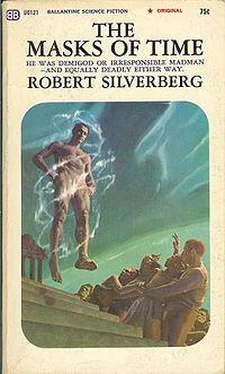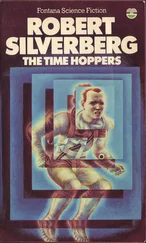Robert Silverberg - The Masks of Time
Здесь есть возможность читать онлайн «Robert Silverberg - The Masks of Time» весь текст электронной книги совершенно бесплатно (целиком полную версию без сокращений). В некоторых случаях можно слушать аудио, скачать через торрент в формате fb2 и присутствует краткое содержание. Год выпуска: 1968, ISBN: 1968, Издательство: Ballantine Books, Жанр: Фантастика и фэнтези, на английском языке. Описание произведения, (предисловие) а так же отзывы посетителей доступны на портале библиотеки ЛибКат.
- Название:The Masks of Time
- Автор:
- Издательство:Ballantine Books
- Жанр:
- Год:1968
- ISBN:0345234464
- Рейтинг книги:3 / 5. Голосов: 1
-
Избранное:Добавить в избранное
- Отзывы:
-
Ваша оценка:
- 60
- 1
- 2
- 3
- 4
- 5
The Masks of Time: краткое содержание, описание и аннотация
Предлагаем к чтению аннотацию, описание, краткое содержание или предисловие (зависит от того, что написал сам автор книги «The Masks of Time»). Если вы не нашли необходимую информацию о книге — напишите в комментариях, мы постараемся отыскать её.
The Masks of Time — читать онлайн бесплатно полную книгу (весь текст) целиком
Ниже представлен текст книги, разбитый по страницам. Система сохранения места последней прочитанной страницы, позволяет с удобством читать онлайн бесплатно книгу «The Masks of Time», без необходимости каждый раз заново искать на чём Вы остановились. Поставьте закладку, и сможете в любой момент перейти на страницу, на которой закончили чтение.
Интервал:
Закладка:
I sighed and said, “Oh, don’t worry, Sandy. I’m on the team for keeps now. It’s the least I can do for you… after Sidney.”
“See you at two. We’ll pick you up and take you across via tunnel because I don’t want you devoured by the media madmen. Stay put until I’m at your door.”
“Right,” I said. I put down the phone, turned, and saw what looked like a puddle of green slime gliding across my threshold and into the room.
It wasn’t slime. It was a fluid audio pickup full of monomolecular ears. I was being bugged from the corridor. Quickly I went to the door and ground my heel into the puddle. A thin voice said, “Don’t do that, Dr. Garfield. I’d like to talk to you. I’m from Amalgamated Network of—”
“Go away.”
I finished grinding my heel. I wiped up the rest of the mess with a towel. Then I leaned close to the floor and said to any remaining ears sticking to the woodwork. “The answer is still No Comment. Go away.”
I got rid of him, finally. I adjusted the privacy seal so that it wouldn’t be possible even to slide a single molecule’s thickness of anything under the door, and waited out the morning. Shortly before two Sandy Kralick came for me and smuggled me into the underground tunnel leading to the White House. Washington is a maze of subterranean connections. I’m told you can get from anywhere to anywhere if you know the routes and have the right access-words handy when the scanners challenge you. The tunnels go down layer after layer. I hear there’s an automated brothel six layers deep below the Capitol, for Congressional use only; and the Smithsonian is supposed to be carrying on experiments in mutagenesis somewhere below the Mall, spawning biological monstrosities that never see the light of day. Like everything else you hear about the capital, I suppose these stories are apocryphal; I suppose that the truth, if it were ever known, would be fifty times as ghastly as the fables. This is a diabolical city.
Kralick led me to a room with walls of anodized bronze somewhere beneath the West Wing of the White House. Four people were in it already. I recognized three of them. The upper levels of the scientific establishment are populated by a tiny clique, inbred, self-perpetuating. We all know one another, through interdisciplinary meetings of one kind or another. I recognized Lloyd Kolff, Morton Fields, and Aster Mikkelsen. The fourth person rose stiffly and said, “I don’t believe we’ve met, Dr. Garfield. F. Richard Heyman.”
“Yes, of course. Spengler, Freud, and Marx, isn’t it? I remember it very fondly.” I took his hand. It was moist at the fingertips, and I suppose moist at the palms too, but he shook hands in that peculiarly untrusting Central European manner by which the suspicious one seizes the fingers of the other in a remote way, instead of placing palm next to palm. We exchanged noises about how pleased we were to make the other’s acquaintance.
Give me full marks for insincerity. I did not think much of F. Richard Heyman’s book, which struck me as both ponderous and superficial at once, a rare feat; I did not care for the occasional reviews he wrote for the general magazines, which inevitably turned out to be neat eviscerations of his colleagues; I did not like the way he shook hands; I did not even like his name. What was I supposed to call an “F. Richard” when we had to use names? “F?” “Dick?” What about “my dear Heyman?” He was a short stocky man with a cannonball head, a fringe of coarse red hair along the back half of his skull, and a thick reddish beard curling down over his cheeks and throat to hide what I’m sure was a chin as round as the top of his head. A thin-lipped sharklike mouth was barely visible within the foliage. His eyes were watery and unpleasant.
The other members of the committee I had no hostilities toward. I knew them vaguely, was aware of their high standings in their individual professions, and had never come to any disagreement with them in the scientific forums where we encountered one another. Morton Fields of the University of Chicago was a psychologist, affiliated with the new so-called cosmic school, which I interpreted to be a kind of secular Buddhism. They sought to unravel the mysteries of the soul by placing it in rapport with the universe as a totality, which has a pretentious sound to it. In person Fields looked like a corporation executive on the way up, say, a comptroller: lean athletic frame, high cheekbones, sandy hair, tight downturned mouth, prominent chin, pale questioning eyes. I could imagine him feeding data into a computer four days a week and spending his weekends slamming a golf ball mercilessly about the fairways. Yet he was not as pedantic as he looked.
Lloyd Kolff, I knew, was the doyen of philologists: a massive thick-bodied man, well along in his sixties, with a seamed, florid face and the long arms of a gorilla. His base of operations was Columbia, and he was a favorite among graduate students because of his robust earthiness; he knew more Sanskrit obscenities than any man of the last thirty centuries, and used them all vividly and frequently. Kolff’s sideline was erotic verse, all centuries, all languages. He supposedly wooed his wife — also a philologist — by murmuring scorching endearments in Middle Persian. He would be an asset to our group, a valuable counterbalance to the stuffed shirt that I suspected F. Richard Heyman to be.
Aster Mikkelsen was a biochemist from Michigan State, part of the group involved in the life-synthesis project. I had met her at last year’s A.A.A.S. conference in Seattle. Though her name has a Scandinavian ring to it, she was not one of those Nordic Junos of whom I am so scandalously fond, however. Dark-haired, sharp-boned, slender, she gave an appearance of fragility and timidity. She was hardly more than five feet tall; I doubt that she weighed a hundred pounds. I suppose she was about forty, though she looked younger. Her eyes held a wary sparkle; her features were elegant. Her clothes were defiantly chaste, modeling her boyish figure as if to advertise the fact that she had nothing to offer the voluptuary. Through my mind there speared the incongruous image of Lloyd Kolff and Aster Mikkelsen in bed together, the beefy folds of his heavy, hairy body thrust up against her slim frail form, her lean thighs and tapering calves straining in agony to contain his butting form, her ankles dug deep into his copious flesh. The mismatch of physiques was so monstrous that I had to close my eyes and look away. When I dared to open them, Kolff and Aster were standing side by side as before, the ziggurat of flesh beside the dainty nymph, and both were peering at me in alarm.
“Are you all right?” Aster asked. Her voice was high and piping, a reedy girlish sound. “I thought you were going to faint!”
“I’m a bit tired,” I bluffed. I could not explain why that sudden image had come to me, nor why it left me so dazed. To cover my confusion I turned to Kralick and asked him how many other members our committee would have. One, he said: Helen McIlwain, the famed anthropologist, who was due at any moment. As though on cue, the door slid open and the divine Helen herself strode into the room.
Who has not heard of Helen McIlwain? What more can be said about her? The apostle of cultural relativism, the lady anthropologist who is no lady, the dogged student of puberty rites and fertility cults who has not hesitated to offer herself as tribeswoman and blood sister? She who pursued the quest for knowledge into the sewers of Ouagadougu to partake of skewered dog, she who wrote the basic text on the techniques of masturbation, she who had learned at first hand how virgins are initiated in the frozen wastes of Sikkim? It seemed to me that Helen had always been with us, going from one outrageous exploit to another, publishing books that in another era would have had her burned at the stake, solemnly informing the television audience of matters that might shock hardened scholars. Our paths had crossed many times, although not lately. I was surprised to see how youthful she looked; she had to be at least fifty.
Читать дальшеИнтервал:
Закладка:
Похожие книги на «The Masks of Time»
Представляем Вашему вниманию похожие книги на «The Masks of Time» списком для выбора. Мы отобрали схожую по названию и смыслу литературу в надежде предоставить читателям больше вариантов отыскать новые, интересные, ещё непрочитанные произведения.
Обсуждение, отзывы о книге «The Masks of Time» и просто собственные мнения читателей. Оставьте ваши комментарии, напишите, что Вы думаете о произведении, его смысле или главных героях. Укажите что конкретно понравилось, а что нет, и почему Вы так считаете.












